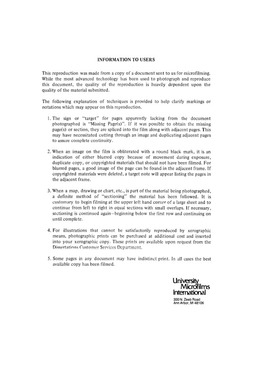| dc.contributor.author | Nelson, Suzanne J., | en_US |
| dc.date.accessioned | 2013-08-16T12:28:57Z | |
| dc.date.available | 2013-08-16T12:28:57Z | |
| dc.date.issued | 1983 | en_US |
| dc.identifier.uri | https://hdl.handle.net/11244/5165 | |
| dc.description.abstract | The presence of the process of professional negotiations between school teachers and boards of education has been a reality since the early 1960s. Stinett (1966) and Moscow (1968) have argued that the interest in the process of professional negotiations is a result of teacher militancy regarding increased teacher desire for participation in the decision making process of the school organization. In a study conducted by Belasco and Alutto (1972), it was concluded that teachers' perceived participation levels influenced job satisfaction levels. If students' needs are to be met, the school organization must be assured of a sufficient supply of motivated teachers who will effectively educate students. Therefore, school administrators and school board members must be concerned with the satisfaction level of teachers. | en_US |
| dc.description.abstract | It should be recognized that even in those districts in which the process of negotiations was alive and well, the teachers displayed moderate decisional deprivation. It is possible that administrators and school board members should try to devise procedures that will include teachers in relevant decision making processes. | en_US |
| dc.description.abstract | The purpose of this study was to investigate the relationship between professional negotiations and teachers' decisional states (levels of perceived participation in the decision making process of the school organization). To secure data for the study, ten non-negotiating school districts were matched to ten negotiating school districts on the basis of revenue per capita and average daily attendance. A decisional participation scale was administered to a random sample of teachers from both types of school districts. This procedure yielded an N of 160. | en_US |
| dc.description.abstract | The study revealed that the process of professional negotiations has a positive impact on teachers' decisional states. Teachers expressed the desire to be more involved in the kinds of decisions that commonly occur in the school organization. There was no evidence that teaching levels, teacher gender, teacher age, or seniority in teaching can be characterized as a typology for participation in organizational decision making. Teachers expressed a consensus of opinion on the kinds of decisions that should involve teachers. | en_US |
| dc.format.extent | ix, 122 leaves : | en_US |
| dc.subject | Education, Administration. | en_US |
| dc.title | Professional negotiation and teachers' decisional states. | en_US |
| dc.type | Thesis | en_US |
| dc.thesis.degree | Educat.D. | en_US |
| dc.thesis.degreeDiscipline | Jeannine Rainbolt College of Education | en_US |
| dc.note | Source: Dissertation Abstracts International, Volume: 44-06, Section: A, page: 1652. | en_US |
| ou.identifier | (UMI)AAI8324893 | en_US |
| ou.group | Jeannine Rainbolt College of Education | |
